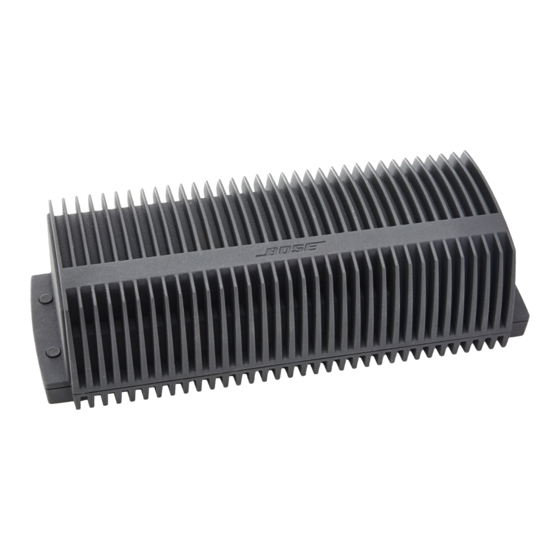Bose Acoustimass 5 Series III Owner's Manual - Page 12
Browse online or download pdf Owner's Manual for Amplifier Bose Acoustimass 5 Series III. Bose Acoustimass 5 Series III 16 pages. Bose lifestyle amplifier user's guide am262840
Also for Bose Acoustimass 5 Series III: Owner's Manual (29 pages), Owner's Manual (22 pages)

- 1. Selecting the Locations for Your Acoustimass System Components
- 2. Examining the Cables and Connections
- 3. Connecting the Cube Arrays to the Acoustimass Module
- 4. Connecting the Acoustimass 5 Series III System to Your Receiver
- 5. Positioning Your Speaker System to Get the Best Sound
- 6. Technical Information
Fine Tuning Your Acoustimass
Using your speaker system to its best advantage
Automatic System Protection
Receiver/amplifier considerations
10
®
5 Series III Speaker System
Your speaker system requires very little attention when set up and connected properly.
However, observing the following guidelines will help maximize your enjoyment.
Room Acoustics
The acoustics (sound properties) of your listening room can affect the overall sound quality of
any speaker system. The following tips will give you some control over the sound:
A. Rooms with a lot of sound-absorbing furnishings, such as stuffed furniture, wall-to-wall
carpet, or heavy drapes, may reduce the treble sound (high frequencies). The missing
treble sound can be restored by slightly turning up the treble control on your receiver or
amplifier. If convenient, you may remove some of the sound-absorbing material.
B. Rooms with too few sound absorbing furnishings, especially those with bare floors and
walls, may sound overly shrill or "bright" because of too much treble. Turning down the
treble control or adding sound absorbers such as throw carpets or drapes will usually
improve the sound.
C. If your system seems to have too much or too little bass (low frequencies), you can adjust
the bass control on your receiver or amplifier. You may also move the Acoustimass
module closer to a wall and/or corner to increase bass. Doing the opposite will decrease
bass.
D. In general, many problems with acoustics can be solved by the judicious use of your tone
controls. Remember, though, that the use of these controls (especially when turned all the
way up) may put greater power demands on your receiver or amplifier. Excessive tone
adjustment can cause an amplifier or receiver to run out of power and distort, potentially
damaging your system.
E. External signal processors (such as graphic and parametric equalizers), while not recom-
mended, can be used with your Acoustimass 5 Series III speaker system if a greater
degree of acoustic control is desired. Consult your Bose
Note: The Acoustimass 5 Series III speaker system incorporates an automatic protection
circuit, which guards against most kinds of damage from electrical stress or overload. This
circuit activates at high volume levels to reduce output, causing a slight decrease in volume.
This is normal operation and indicates that power input may be exceeding safe levels.
Sustained listening at these levels is not recommended.
Note: Your speakers incorporate heavy-duty driver elements designed to resist many types
of electrical stress. However, any speaker can be damaged if the amplifier driving it fails.
Increasing the volume until the music sounds distorted also causes speaker damage. This
can happen even with a low-powered receiver or amplifier.
Your speaker system is designed for use with receivers or amplifiers rated from 10 to 200
watts per channel with 4 to 8 ohm impedance. For further information, refer to your receiver
or amplifier owner's guide.
October 23, 2001
®
dealer for advice.
AM196451_05_V.pdf
